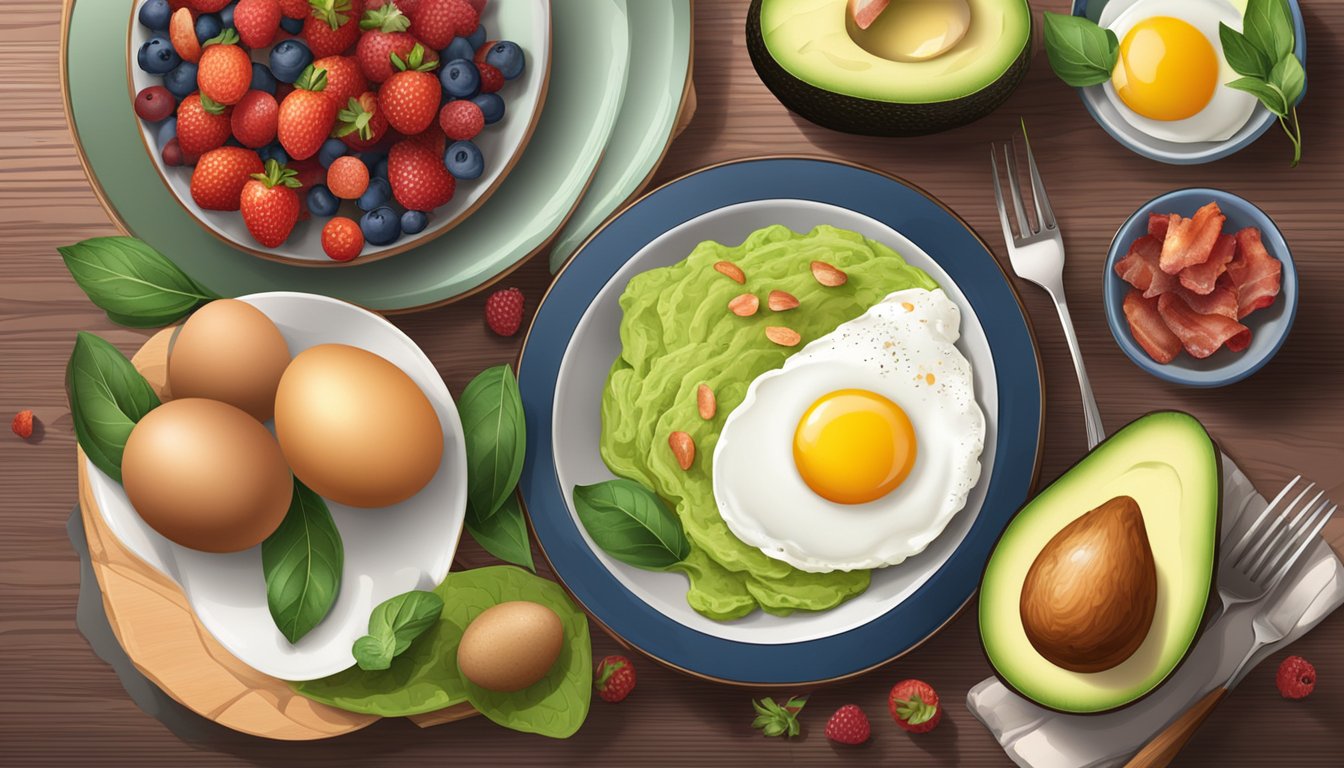Keto breakfast options offer a delicious way to start the day while adhering to a low-carb, high-fat diet. These meals focus on minimal carbohydrates and increased fat content to help maintain ketosis, a metabolic state where the body burns fat for fuel instead of glucose. By choosing keto-friendly breakfast foods, individuals can support their weight loss goals and potentially experience improved energy levels throughout the morning.
From savory egg dishes to creative pancake alternatives, keto breakfast ideas span a wide range of flavors and textures. Many recipes incorporate ingredients like cream cheese, almond flour, and eggs to create satisfying meals that align with ketogenic principles. These breakfast options often provide sustained energy and help curb cravings, making them popular among those following a ketogenic lifestyle.
1) Keto Avocado Egg Bake
Keto Avocado Egg Bake is a simple yet satisfying breakfast option for those following a ketogenic diet. This dish combines the creamy texture of avocados with the protein-rich goodness of eggs.
To prepare this meal, one starts by halving ripe avocados and removing the pits. The avocado halves are then placed on a baking sheet, and eggs are carefully cracked into the cavities where the pits were.
The avocado and egg combination is baked in a preheated oven for approximately 15 to 20 minutes. This allows the egg whites to set while the yolks remain slightly runny, creating a perfect texture contrast.
For added flavor, the dish can be seasoned with salt and pepper to taste. Some variations include sprinkling cheese on top after baking or adding a small amount of fresh salsa for a southwestern twist.
This keto-friendly breakfast is high in healthy fats and protein, making it an excellent choice for those looking to maintain ketosis. It’s also naturally low in carbohydrates, with each serving containing only a small amount of net carbs.
2) Chia Seed Pudding
Chia seed pudding is a versatile and nutritious keto breakfast option. This simple dish requires minimal preparation and can be customized to suit individual tastes.
To make chia seed pudding, combine chia seeds with a low-carb milk alternative such as coconut or almond milk. The mixture is then refrigerated overnight, allowing the chia seeds to absorb the liquid and create a pudding-like consistency.
Chia seeds are rich in fiber and omega-3 fatty acids, making them an excellent choice for those following a ketogenic diet. A typical serving of chia seed pudding contains only 1-2 grams of net carbs.
For added flavor and nutrients, keto-friendly toppings can be incorporated. Popular choices include berries, nuts, and sugar-free sweeteners. Some variations include chocolate or vanilla flavoring for a more indulgent treat.
Chia seed pudding is ideal for meal prep, as it can be prepared in advance and stored in individual portions. This makes it a convenient grab-and-go breakfast or snack option for busy individuals following a keto lifestyle.
3) Keto Pancakes
Keto pancakes offer a delicious low-carb alternative to traditional breakfast fare. These fluffy creations typically use almond flour or coconut flour instead of wheat flour, significantly reducing carbohydrate content.
Eggs play a crucial role in keto pancake recipes, providing structure and protein. Some variations incorporate cream cheese to enhance flavor and texture while masking any eggy taste.
A basic keto pancake recipe often includes almond flour, eggs, butter, vanilla extract, a keto-friendly sweetener, and baking powder. This combination yields a batter that cooks up into tender, satisfying pancakes.
For those seeking variety, adding cocoa powder can create chocolate pancakes. Other flavor options might include cinnamon, berries, or sugar-free chocolate chips.
Keto pancakes generally contain around 6 grams of carbohydrates and 6 grams of protein per serving. This macronutrient profile makes them suitable for maintaining ketosis while enjoying a familiar breakfast treat.
Preparation is typically quick, with many recipes taking just 15-20 minutes from start to finish. Some versions can even be made in a minute, offering a fast solution for busy mornings.
4) Egg and Sausage Muffins
Egg and sausage muffins are a popular keto breakfast option that combines protein-rich ingredients in a convenient, portable form. These savory muffins are easy to prepare and can be made in advance for quick weekday breakfasts.
The base of these muffins consists of beaten eggs mixed with cooked sausage. Ground turkey sausage is a lean option that works well in this recipe. Adding low-carb vegetables like onions and bell peppers can enhance the flavor and nutritional value.
Cheese is often incorporated into the egg mixture, providing additional protein and healthy fats. Cheddar, mozzarella, or a blend of cheeses can be used depending on personal preference.
To prepare, the sausage is typically cooked with onions and garlic before being added to the egg mixture. This step enhances the overall flavor of the muffins.
The mixture is then poured into greased muffin tins and baked until set. It’s important not to overfill the cups to prevent overflow during baking.
These muffins are not only keto-friendly but also gluten-free and grain-free. Each muffin typically contains around 1 gram of net carbs and 13 grams of protein, making them an excellent choice for those following a low-carb diet.
5) Almond Flour Waffles
Almond flour waffles are an excellent keto-friendly breakfast option. These waffles offer a delicious alternative to traditional wheat-based versions, while keeping carbohydrates low.
The main ingredient, almond flour, provides a nutty flavor and creates a satisfying texture. It also contributes healthy fats and protein, making these waffles more filling than their high-carb counterparts.
Most recipes for almond flour waffles are simple, requiring only a few ingredients. Common components include eggs, cream, and a pinch of salt along with the almond flour.
For those with nut allergies, substitutions are possible. Sunflower seed meal or a blend of coconut flour and sunflower seed butter can be used instead of almond flour.
These waffles can be customized to suit various tastes. Adding sugar-free chocolate chips, blueberries, or toasted nuts can enhance flavor and texture.
Almond flour waffles typically turn out crispy on the outside and tender on the inside. They pair well with sugar-free syrups or fresh berries for a complete keto breakfast.
6) Coconut Flour Crepes
Coconut flour crepes offer a delicious keto-friendly breakfast option. These thin, versatile pancakes require only six ingredients, making them simple to prepare.
The main components include eggs, cream cheese, and coconut flour. Some recipes incorporate Parmesan cheese for added flavor and texture.
To make the batter, blend the ingredients until smooth. Coconut flour and xanthan gum are often added gradually to achieve the desired consistency.
Cooking these crepes requires a non-stick pan and careful temperature control. Pour a small amount of batter and swirl the pan to create a thin layer.
These crepes can be served sweet or savory. For a sweet version, fill them with low-carb fruits and sugar-free syrups. Savory options might include cheese, meats, or vegetables.
With less than 3g net carbs per crepe, they fit well into a ketogenic diet. They can be enjoyed hot or cold, making them suitable for meal prep.
Coconut flour crepes provide a satisfying alternative to traditional wheat flour crepes for those following a low-carb lifestyle.
7) Smoked Salmon Omelette
A smoked salmon omelette is a luxurious and satisfying keto-friendly breakfast option. This dish combines the richness of eggs with the smoky flavor of salmon and the tangy taste of cheese.
To prepare, eggs are whisked and cooked in a pan until set. Smoked salmon is then added as a filling, often accompanied by cream cheese or feta for extra richness and flavor.
Dill is a popular herb choice for this omelette, complementing the salmon perfectly. Some recipes may include capers or finely chopped red onion for added zest and texture.
This meal is not only delicious but also nutritious. It provides a good balance of protein and healthy fats, essential for those following a ketogenic diet.
A typical smoked salmon omelette contains approximately 20-25 grams of protein and 10-15 grams of fat. These macronutrients help keep diners feeling full and satisfied throughout the morning.
This dish can be prepared quickly, making it an excellent choice for busy mornings. It can be served on its own or paired with low-carb sides for a more substantial meal.
8) Keto Yogurt Parfait
Keto yogurt parfaits offer a delicious and nutritious breakfast option for those following a low-carb diet. These parfaits typically contain high-protein Greek yogurt layered with keto-friendly toppings.
A standard keto yogurt parfait contains only 5g net carbs per serving, making it an ideal choice for maintaining ketosis. The high protein content helps keep individuals feeling full and energized throughout the morning.
Popular toppings for keto yogurt parfaits include berries, nuts, and sugar-free granola. These add flavor, texture, and additional nutrients without significantly increasing the carb count.
For added richness, some recipes suggest incorporating heavy cream into the yogurt mixture. This boosts the fat content, aligning more closely with keto macronutrient ratios.
Keto yogurt parfaits are easily customizable to suit individual tastes. Variations may include different flavor extracts, such as vanilla or almond, to enhance the overall taste profile.
These parfaits can be prepared in advance and stored in the refrigerator for up to three days. This makes them an excellent option for meal prepping or busy mornings.
9) Breakfast Egg Muffins
Breakfast egg muffins are a popular keto-friendly option for busy mornings. These portable, protein-packed treats can be prepared in advance and easily customized to suit individual tastes.
To make keto egg muffins, start by whisking eggs with salt and pepper. Preheat the oven to 375°F (190°C) and grease a muffin tin.
Add your favorite low-carb ingredients to the egg mixture. Popular choices include cheese, diced ham, bell peppers, tomatoes, and spinach. Pour the mixture into muffin cups, filling each about 2/3 full.
Bake the egg muffins for 15-20 minutes until set and lightly golden. Allow them to cool before removing from the tin.
These versatile egg cups can be stored in the refrigerator for up to five days or frozen for longer-term storage. Simply reheat in the microwave for a quick and satisfying keto breakfast.
Egg muffins are not only convenient but also highly nutritious. They provide a good balance of protein and healthy fats while keeping carbs low, making them an excellent choice for those following a ketogenic diet.
10) Zucchini Hash Browns
Zucchini hash browns offer a delicious low-carb alternative to traditional potato-based versions. These crispy, savory patties make an excellent keto-friendly breakfast option.
To prepare, start by shredding about 1.5 pounds of zucchini. Add salt and let it sit for 15 minutes to draw out excess moisture. Squeeze the zucchini to remove as much water as possible.
Mix the drained zucchini with eggs, grated Parmesan cheese, and minced garlic or garlic powder. Form the mixture into patties and fry them in oil until golden brown and crispy on both sides.
For added flavor, consider incorporating herbs like dill or chives. Some recipes suggest using almond flour or coconut flour to help bind the ingredients and achieve a crispier texture.
Zucchini hash browns can be served alongside eggs, bacon, or avocado for a complete keto breakfast. They’re also versatile enough to be enjoyed as a side dish for lunch or dinner.
This keto-friendly dish provides a good balance of nutrients while keeping carbohydrates low. It’s an excellent way to incorporate more vegetables into the morning meal routine.
Understanding The Keto Diet

The ketogenic diet is a low-carb, high-fat eating plan designed to induce ketosis. This metabolic state shifts the body’s primary fuel source from glucose to ketones, produced from fat breakdown.
What Makes A Meal Keto-Friendly
Keto-friendly meals typically consist of 70-80% fat, 20-25% protein, and 5-10% carbohydrates. Foods allowed include:
- Meats and fatty fish
- Eggs
- High-fat dairy products
- Nuts and seeds
- Low-carb vegetables
- Healthy oils
Restricted items include:
- Grains and starches
- Most fruits
- Legumes
- Sugar and sweetened products
To maintain ketosis, daily carb intake is usually limited to 20-50 grams. Careful meal planning and macronutrient tracking are essential for success on the keto diet.
Benefits Of Keto Breakfasts
Keto breakfasts offer several potential advantages:
- Sustained energy: High-fat meals provide steady fuel throughout the morning.
- Improved focus: Ketones can enhance mental clarity and concentration.
- Reduced cravings: Fat and protein promote satiety, curbing mid-morning snacking.
- Blood sugar control: Low-carb meals help stabilize glucose levels.
- Weight management: Keto breakfasts may support fat loss and metabolism.
Keto-friendly breakfast options include eggs with avocado, Greek yogurt with berries and nuts, or low-carb smoothies made with coconut milk and protein powder. These meals can kickstart ketosis and provide essential nutrients to start the day.
Nutritional Considerations
Keto breakfasts require careful attention to macronutrient ratios and specific ingredient choices. A well-planned keto breakfast provides sustained energy and supports ketosis.
Macronutrient Breakdown
The ketogenic diet typically aims for a macronutrient ratio of 70-75% fat, 20-25% protein, and 5-10% carbohydrates. For breakfast, this translates to approximately 30-40 grams of fat, 20-25 grams of protein, and under 10 grams of net carbs.
Achieving these ratios often involves combining high-fat foods like avocados, eggs, and cheese with moderate protein sources. Low-carb vegetables can provide essential nutrients while keeping carb intake minimal.
Essential Ingredients For Keto Breakfasts
Key ingredients for keto breakfasts include:
- Eggs: Versatile and rich in protein and healthy fats
- Avocados: High in monounsaturated fats and fiber
- Full-fat dairy: Cheese, cream, and butter for added fats
- Low-carb vegetables: Spinach, kale, and bell peppers for nutrients
- Nuts and seeds: Almonds, chia seeds, and flaxseeds for healthy fats
These ingredients can be combined in various ways to create satisfying and nutritious keto breakfasts. Portion control remains important to maintain appropriate calorie intake while meeting macronutrient goals.
Common Mistakes
Navigating a ketogenic diet can be challenging, especially when it comes to breakfast. Two key areas where people often stumble are misunderstanding fats and overlooking hidden carbohydrates.
Misconceptions About Fats
Many newcomers to keto mistakenly avoid all fats, not realizing their importance. Healthy fats are crucial for maintaining ketosis and providing energy. Some beneficial sources include:
- Avocados
- Olive oil
- Coconut oil
- Grass-fed butter
- Fatty fish (salmon, mackerel)
It’s essential to focus on quality fats rather than simply increasing fat intake indiscriminately. Processed or trans fats should be avoided.
Balancing fat intake with adequate protein is also vital. Protein helps preserve muscle mass and promotes satiety.
Avoiding Hidden Carbs
Carbohydrates can lurk in unexpected places, derailing ketosis. Common culprits include:
- Condiments (ketchup, barbecue sauce)
- Non-dairy creamers
- Some nuts and seeds
- Certain vegetables (onions, garlic)
Reading nutrition labels carefully is crucial. Be wary of “low-carb” or “keto-friendly” processed foods, which may contain hidden sugars or starches.
Tracking daily carb intake helps maintain awareness. Most people aim for 20-50 grams of net carbs per day on a ketogenic diet.




